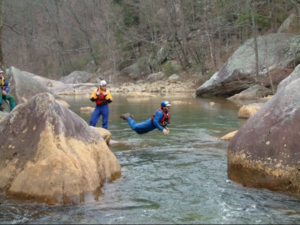On Quitting my Day Job
I took the leap.
I gave notice at my day job.
It’s pretty terrifying. I have a few things in the pipeline, but it’s a big risk. I’ve got another month of steady work, then it’s me and my little freelance shingle, hoping I can make it work.
And this is the photo I’ve been looking at every time I get spooked. That’s my friend Dennis, who died last month. Denny was the first person outside of my family who truly saw me. We spent the summer after I graduated from high school leading canoe trips in the Boundary Waters and talking. It was one of those summers you hope for any young person you love — we were besotted with each other. We spent every waking moment together, and most of it we spent talking (no surprise to anyone who knows either of us). He was never my boyfriend — he was three years older than I am and had a girlfriend at college he was moving in with, and I was a very young 17 year old that way. But we loved one another. I have the letters he wrote me on birchbark to remind me. And then, years later, when I was suffocating in New York City, and flailing around trying to figure out what to do with myself and frightened I’d made a terrible mistake and had ruined my life, Denny came to the rescue again. He got me a job at the Nantahala Outdoor Center, and backed me up when my mother was furious I’d left a good job in New York City to go be a raft guide, and loaned me a boat so I could learn to really paddle. Denny was in love with Nancy by then, who he married, and had two gorgeous girls with, and just left behind.
Dennis lived every single day to the fullest. He was the most enthusiastic person I’ve ever known, and the most authentic. He spent a lifetime teaching wilderness EMT courses, and saving people’s lives. He and Nancy took their girls on an adventure of a childhood, living in an RV while they taught courses all over, from the Southeast, to Alaska, to Arizona and finally settling, in a real house, in Maine. That Denny could get a chronic illness, and then a very quick cancer and then die has shaken even me, the woman who has lost so many people I really love, to the core.
There is no time to waste.
And so, I’m jumping off the rock even though the timing is not ideal. Look at that photo. It’s cold in that photo. Denny’s jumping in even though it’s so cold there’s no leaves yet on the trees – that water is COLD — and yet, there he is, leaping into the river — for what, I’m not sure. To demonstrate something for a river rescue class, perhaps to actually rescue someone, perhaps because he’s Denny and he always jumped in.
The house is paid for. There are two half-written novels and a pile of essays that might, someday come back into a nonfiction book. There are environmental issues I want to write about and essays I’ve been dictating into my phone on morning dog walks about knitting and sewing and creativity. I went to a reading last week, and for the first time in fifteen years looked up and thought I’m ready to get back up on that stage.
I accomplished my goal at my day job. I paid off my PhD. I paid off my house. I have money in my retirement savings.
And now it’s time to leap.
If you’d like to come along for the ride, please subscribe on the home page.
